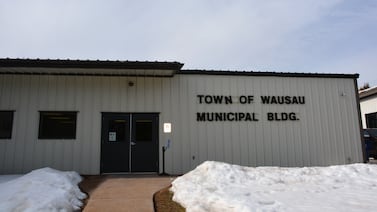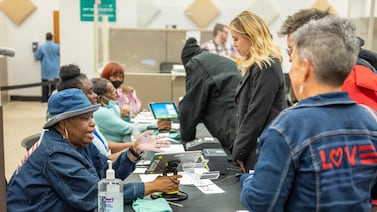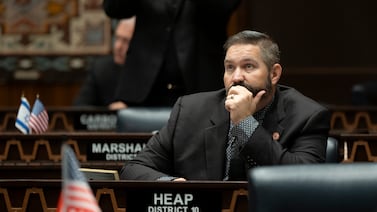Votebeat is a nonprofit news organization reporting on voting access and election administration across the U.S.
This news analysis was originally distributed in Votebeat’s free weekly newsletter. Sign up to get future editions, including the latest reporting from Votebeat bureaus and curated news from other publications, delivered to your inbox every Saturday.
In a closely watched case this week, the U.S. Supreme Court rejected most of a Republican request that would have disenfranchised more than 40,000 Arizona voters who didn’t provide documented proof of citizenship when they registered and would have prevented them from voting in November’s presidential election.
But there’s more to come and more at stake. The Supreme Court ruled on an emergency request, but the complex case could yet upend voting rights precedent as it moves back through the lower courts.
Republicans are making a broad argument in their effort to void the registrations. They contend that Congress largely cannot regulate presidential elections, authority that the U.S. Justice Department said has been established for more than a century. Lawyers opposing that argument say they are prepared for the case to work its way back to the Supreme Court. The next scheduled step in the case is arguments before the 9th U.S. Circuit Court of Appeals next month.
“The likelihood of getting a lower court to bite on something like that, that’s basically foreclosed by precedent, is very low,” said Danielle Lang, a senior director of voting rights for the Campaign Legal Center who is representing several parties opposing the Republican request. “From the beginning, they were telegraphing their strategy, and it was a Supreme Court strategy.”
That means the question of whether Congress can regulate presidential elections — as well as whether Arizona can place the new restrictions on voters without the documented proof of citizenship — could wind up back before the Supreme Court, albeit after the November election.
Arizona’s unique voting laws require documented proof of U.S. citizenship to vote in state and local elections. But federal law allows voters without such proof to cast ballots in federal races like president and Congress. It requires only that voters attest, under penalty of perjury, that they are citizens and eligible to vote. So since 2013, thanks to an earlier Supreme Court ruling, Arizona has had a split system, placing voters who didn’t supply proof of citizenship on a “federal only” list, which now numbers around 41,000.
A Votebeat analysis of the 32,000 voters who are on the federal-only list as of last year found that they’re more likely to be young residents and people living on or around college campuses. Other research has found that newly naturalized voters are also more likely to be on the federal-only list.
Republicans say the different documentation requirements for federal elections could allow noncitizens to vote illegally, an issue they’ve been increasingly vocal about, even though such cases are extraordinarily rare.
In 2022, Arizona Republicans enacted laws restricting how federal-only voters could participate in elections, and also required frequent voter citizenship checks. Following challenges from voting rights groups, the U.S. District Court of Arizona ruled in May that substantial portions of the 2022 statutes violate federal laws, though it allowed the state to enforce portions of the law requiring more citizenship checks. Republican legislative leaders and the state Republican Party then asked the appeals court to temporarily suspend parts of that ruling.
The result of that request has been a legal back-and-forth in recent weeks, specifically over the forms that voters use to register. First a federal appeals court panel issued a temporary ruling that said voters could still register as federal-only voters, without citizenship proof, as long as they used a federal registration form, instead of the far more commonly used state form. Then another panel of judges vacated that ruling, briefly allowing residents to again register as federal-only voters with the state form.
With the Supreme Court’s order Thursday, Arizona residents without citizenship proof again will have their registrations rejected unless they use the federal form. The justices rejected Republicans’ request to halt other parts of the lower court decision on an emergency basis.
Arizona Secretary of State Adrian Fontes, a Democrat, had told the court that siding with Republicans and changing the rules this close to the elections could create chaos.
As is normal for an emergency order, the justices did not lay out the reasoning behind their decision. Seven justices, though, did disclose their position on the Republicans’ request. Justices Samuel Alito, Neil Gorsuch, and Clarence Thomas would have granted the emergency stay in full — allowing the tighter restrictions on the federal-only voters. Justices Amy Coney Barrett, Elena Kagan, Ketanji Brown Jackson, and Sonia Sotomayor would have denied it in full. The order didn’t disclose positions taken by Chief Justice John Roberts or Justice Brett Kavanaugh, but they presumably voted in favor of the partial stay, since four justices were on the record as preferring to deny it.
Lang, from the Campaign Legal Center, cautioned against reading too much into the justices’ positions on an emergency stay request, especially since concern about upending the law this close to November’s election might have weighed heavily on the court. As it is, she said, she believes that the so-called Purcell Principle, which calls for not changing election rules close to an election, should argue against even the limited order endorsed by a majority of the justices.
“I don’t think we can take anything for given on where the justices are on the merits,” she said. “We just have to make our best case.”
Votebeat Arizona reporter Jen Fifield contributed.
Carrie Levine is Votebeat’s managing editor and is based in Washington, D.C. She edits and frequently writes Votebeat’s national newsletter. Contact Carrie at clevine@votebeat.org.
Meanwhile, at the Democratic convention …
Democrats, at least, are clearly signaling their belief that Congress can regulate all federal elections.
During Vice President Kamala Harris’ speech Thursday accepting the presidential nomination, she reminded Democrats that they still have a pair of ambitious voting rights bills sitting on a shelf waiting for a chance at passage. Ticking through a list of fundamental freedoms at stake in November, she stopped to note: “With this election, we finally have the opportunity to pass the John Lewis Voting Rights Act and the Freedom to Vote Act.”
The two bills have been around for a while in different forms and faced decent prospects in 2021 and 2022, when Democrats briefly controlled both chambers of Congress. The obstacles to passage in the Senate were two members of their own party, Joe Manchin of West Virginia and Kyrsten Sinema of Arizona, who wouldn’t agree to alter filibuster rules to allow Democrats to try to pass the measures on a majority vote. Both senators now are on their way out.
The Freedom to Vote Act (previously known as the For the People Act, or HR1) is a massive legislative package that would:
- Require expanded voting options in every state, particularly no-excuse vote by mail and in-person early voting;
- Set national standards for voter registration opportunities, accommodations for voter with disabilities, and voter ID laws;
- Instill legal and process protections for election officials and ballot security;
- Aim to prevent partisan gerrymandering; and
- Reform campaign finance laws.
The John Lewis Voting Rights Advancement Act primarily would shore up the 1965 Voting Rights Act to provide more protections against discriminatory voting rules, in response to the Supreme Court’s nullifying of key provisions in 2013. The bill would restore a formula for requiring certain local jurisdictions to get Justice Department permission — known as preclearance — before making changes to voting rules or election districts.
Harris described the election as an “opportunity” for those bills, because their fate depends entirely on who controls Congress in 2025. If Democrats retake the House and hold the Senate in November (which is a big if), they then could craft a strategy to pass the bills. But there are no guarantees.
As Senate Majority Leader Chuck Schumer emphasized in optimistic interviews at the convention, Senate Democrats would still have to overcome the filibuster. With Manchin and Sinema gone, the path forward would depend on the Senate’s new arrivals. See Patrick Marley’s excellent reporting in the Washington Post about the opposition to the bills — conservatives see them as a federal intrusion — and the practical concerns that would likely make passing and implementing the laws difficult for Democrats.
— Chad Lorenz
Chad Lorenz is Votebeat’s editor in chief and is based in Denver. Contact Chad at clorenz@votebeat.org.






